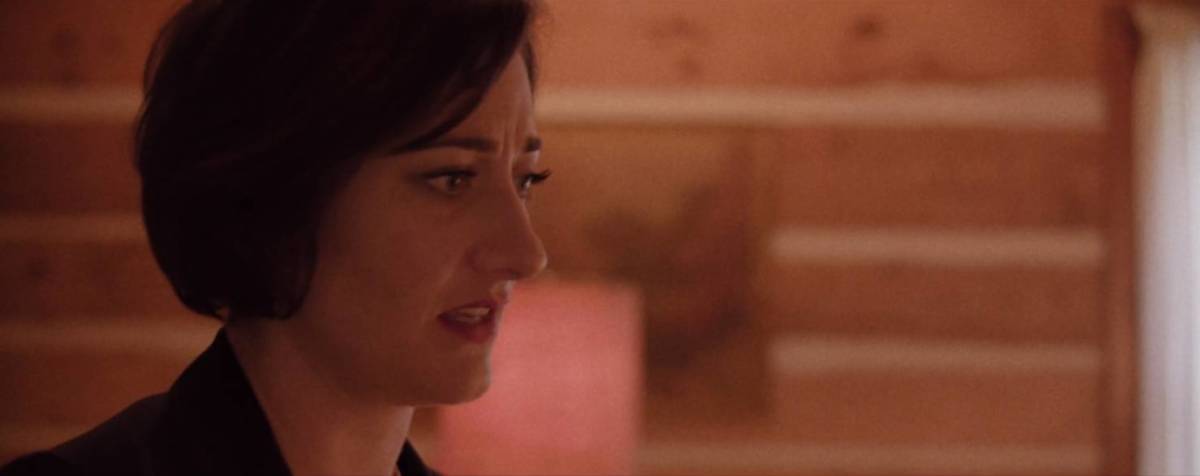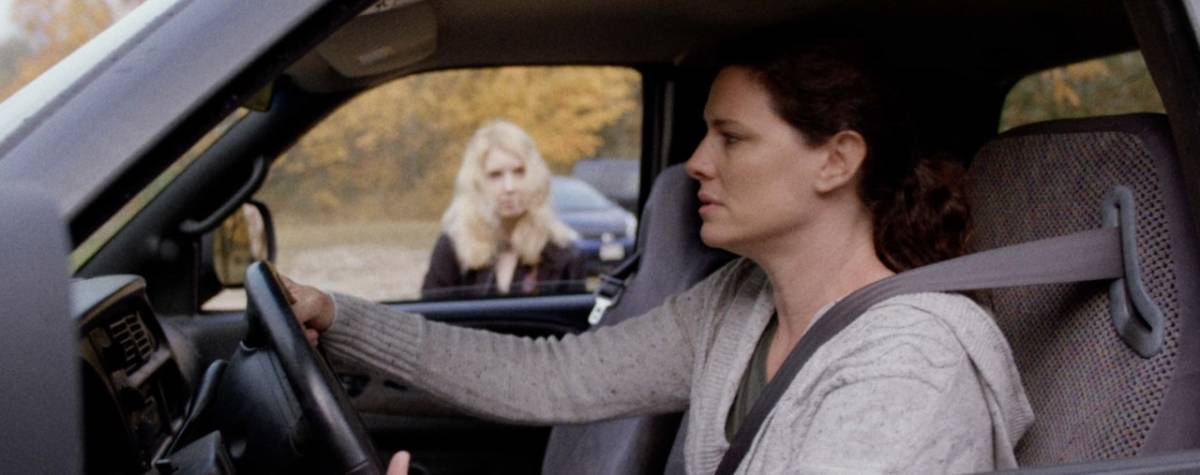Back at the Staircase writer-director Drew Britton and actress Jennifer Lafleur sat down with Cultured Vultures during the Slamdance Film Festival on January 21, 2018. They were joined by actress Leonora Pitts.
Thank you for joining Cultured Vultures today. Congratulations on your new film, Back at the Staircase! What was the reaction like during the world premiere on Friday afternoon?
Jennifer Lafleur: It was a really warm reception, I think. It had a lot more comedic moments than I thought that it had—when people are asking is it a comedy, is it a drama, is it a dramedy than saying that it’s pretty much a drama. There are some moments of tense laughter that I really enjoyed. It’s always an interesting experience to watch a movie with an audience. It’s totally different from watching it by yourself on a computer screen.
Drew Britton: A lot of the laughter felt like it was due to the uncomfortable moments. There was never any gags per se or intentional ones were we’re like this is going to be funny. It’s more just situational humor which in comedy arises from characters in their inability to communicate with one another. A lot of it was just stuff that were just passing moments that you never think would get a reaction. You kind of laugh and thought, I never thought that would be funny. It’s just your perception of it just having lived with it for months and months—all that goes out the window because you’re so focused the story. As soon as people start reacting, oh, this is nice, it’s working.
Drew, you were a big fan of Jennifer’s work in The Midnight Swim, right?
Drew Britton: Correct. Yes.
Did you write this role with her in mind or was there a backup plan if she said no?
Drew Britton: It was funny because I don’t do auditions. I cast very organically, I guess you could say. All the cast members I acquired were people that I had just fallen in love with. So that’s pretty much why they had known each other. They run in the same circles. They work on the same films. They know a lot of the same people so that was just purely coincidental. I guess it makes a lot more sense once you realize the way I cast and that’s—I had fallen in love with her in The Midnight Swim as well as Mad that played here a couple years ago. It was just a matter of watching these movies and be like, she’d be perfect for Trisha. Or watching Manson Family Vacation and be like, she’d be perfect for Jody. I got really lucky. I reached out to them, with my fingers crossed, read the script. It was much more that as opposed to go put yourself on tape, send it back, and maybe I’ll give some feedback. It was just much more instinctual and be like I know that person can pull it off from what I’ve seen them do prior.
Jennifer Lafleur: Which is interesting because Trisha is a very different role from anything than I played which is why I was especially interested in coming on board with this film because I usually play characters are kind of alpha ladies, type A, maybe a little orderly or a little bitchy. I’m usually working against that to ground them and make them warmer and more human. When he sent me the script, I was really interested in playing this very vulnerable woman who was coming off of being a caretaker for her father for ten years and is now in the precipice of thinking she was going to have to do that again for her mother. So that was all interesting to me.
Drew Britton: It was all instinctual. It was just watching the inflection that she does in her voice as well as her face. The way she can emote without having to say a lot of dialogue. It was much more than be like I know that person in real life.

These characters have their own coping strategies following an accident. Do you have any of your own?
Jennifer Lafleur: My coping strategy is keep moving forward, keep moving forward, keep moving forward. My husband is also in the business and the constant auditioning, and trying to create your own stuff and or take meetings and get projects going can be pretty intense and hard on the heart. We just kind of keep telling each other, oh, we just got to keep moving forward and don’t look back. Everybody has their own path. Just keep going.
Drew Britton: Supporting yourself with people that are also going to be supportive of your own work as well as people you think you work again with and just avoiding people that you may not have a good chemistry with and good working relationship with. Really just try to keep yourself grounded and just keep your nose to the grindstone. Like she said, keep plowing forward.
Who are some of your filmmaking influences?
Drew Britton: I’m really into the old Cassavetes method in allowing the actors a lot of creative freedom and that’s how we approached this. I turned the roles over to them. They’re just such strong, domineering, women and I think it would be a disservice to them to say let me tell you how to act. I would just say, this is your role and do whatever you want with it. They would come to me a lot of times and say, this isn’t working for me. Okay, change it. Whatever’s going to give you a better performance is ultimately going to make it a better film so kind of the approach that he that did with actors in general with lending it over to the people. A lot of the films they worked on had the same approach—they just had creative freedom. So the Cassavetes stuff, the Duplass stuff, as well as some old Ingmar Bergman stuff, and Kelly Reichart’s a huge influence as well—she allows the characters to deal with one another in completely different ways than they might with other characters in the film. It really runs the gambit. Primarily, the personal relationship films that deal with drastically different dynamics from the characters.
What was your writing process like?
Drew Britton: We did do a full-fledged script. We spent about a year just writing the script. I was more than happy to throw it out the window once we got on set and stuff wasn’t working. A lot of directors do like the approach and say this is the script, it’s got all of this. I’m much more open to collaboration—it’s my favorite thing in filmmaking.—getting in a room with people and figuring what’s going to work best for the scene. That’s a lot of what we did. Some scenes are completely different than they were in the script. The final three scenes—we completely improvised. We had a structure of what was going to happen. When something is really working and you see lightning strike, you just kind of keep going with that. A lot of that was just throwing the script out the window and trying to work from our instincts. The girls would up to me and I could see them being like, so we changed this, and I could see them being like how’s he going to react—
Jennifer Lafleur: Is he going to be okay with this?
Drew Britton: I just go, okay. If that’s going to inform a better performance, that’s all I care about.
Leonora Pitts: I think we said, we were hoping to change this?
Jennifer Lafleur: Leonora and I would kind of get together at one of our places and Mickey [O’Hagan] and Steven [Plunkett] as well, who are two of the other actors in the film. We would read it out and just say, okay, what feels like it’s working and what feels like it’s not working. We would get it into our bodies and mouths and make tweaks. Drew was always so accommodating in supporting us and how we wanted our characters to speak and what we wanted them to say but we always stuck with the arc and nuts and bolts of the story.
Drew Britton: That’s one thing that’s really tough. I think it would be really disrespectful to say especially working with a lot of strong female actors—this is how you should feel so I would say, however you feel in the moment, I’m going to give you that full creative freedom. I think it’s really disrespectful as a director to tell certain people how to feel especially if they’re going with their own instincts. It’s kind of like manipulating them. I’m not about that. I’m much more in service of changing the story in favor of whatever’s going to be the most valuable and truthful. That happened a lot. Like she was saying, she would come to me and say, we were hoping to tweak this. I’d be like, okay, whatever’s going the best for you guys.
Jennifer Lafleur: I think it stayed true to the story that you created but tailored to the actors.
Drew Britton: The script had a similar blueprint. I would approach the scenes so if they were really firing and improving. I would say, we need to start here and need to hit these points and then we got to end here. However you get there is totally up to you. It would get gentle and go back and forth. That’s where editing comes into play—we can change it once I get in the editing room. It was just a lot of using the structure of the screenplay—we know what we have to achieve, however we achieve it, and I guess we’ll find out.
Congrats again on the film and thank you again for your time.
Jennifer Lafleur: Thanks, Danielle.
Drew Britton: Thank you very much.
Some of the coverage you find on Cultured Vultures contains affiliate links, which provide us with small commissions based on purchases made from visiting our site.

